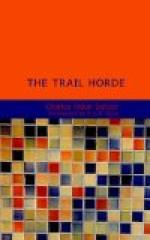Two years before—aware of the previous losses—Lawler had erected a wire fence across the big break, extending from a craggy mountain wall on the western end, to a sheer butte that marked the end of the break, eastward.
Lawler had sent Red King to the crest of the valley on his way to the Hamlin cabin, when he noted that the cloud bank in the north had grown denser, nearer. The wind had increased in velocity, and he had to lean against it as he rode; and it was so cold and raw that he drew his heavy cap down over his eyes to shield them, and drew over his mouth the heavy woolen scarf he wore around his neck.
He rode on a short distance, casting troubled glances into the north. He found himself wondering if Davies and Harris had gone to the line camp. If they hadn’t, and a storm broke, the herd on the big level was in danger.
He brought Red King to a halt. The big horse pranced, whistling eagerly. He champed on the bit, tossed his head, raising it finally and staring straight into the north.
“You see it too, eh, King?” said Lawler. “Well, we can’t take that chance; we’ll have to go to the camp.”
He headed Red King down into the valley again, where the bitter wind did not strike them, riding westward rapidly.
It was noon before Lawler and Red King had traveled half the distance to the line camp. A dull, gray haze was sweeping southward. It mingled with the southern light and threw a ghostly glare into the valley, making distance deceptive, giving a strange appearance to the landmarks with which Lawler and the horse were familiar.
Lawler increased Red King’s pace. He saw that the storm was nearer than he had thought, and he would have to work fast to get the cattle headed into the valley before it broke.
The distance from the Circle L ranchhouse to the big plain near the line cabin was about fifteen miles, and the trail led upward in a long, tiresome rise. Yet Red King struck the level with a reserve strength that was betrayed by the way he fought for his head as he saw the level stretch before him. He was warmed up—he wanted to run.
But Lawler drew him down in an effort to locate the herd before he started toward it.
Man and horse made a mere blot on the yawning expanse of land that stretched away from them in all directions. A lone eagle in the sky or a mariner adrift on a deserted sea could not have seemed more isolated than Lawler and Red King. In this limitless expanse of waste land horse and rider were dwarfed to the proportion of atoms. The yawning, aching, stretching miles of level seemed to have no end.
Several miles into the north Lawler saw the herd. Directly westward, at a distance of about a mile, he saw the line cabin. No smoke was issuing from the chimney; and so far as he could discern, there were no men with the cattle.
Harris and Davies had overstayed. That knowledge might have been responsible for the grim humor in Lawler’s eyes; but the rigidness of his body and the aggressive thrust to his chin were caused by knowledge of a different character. The storm was about to break.




